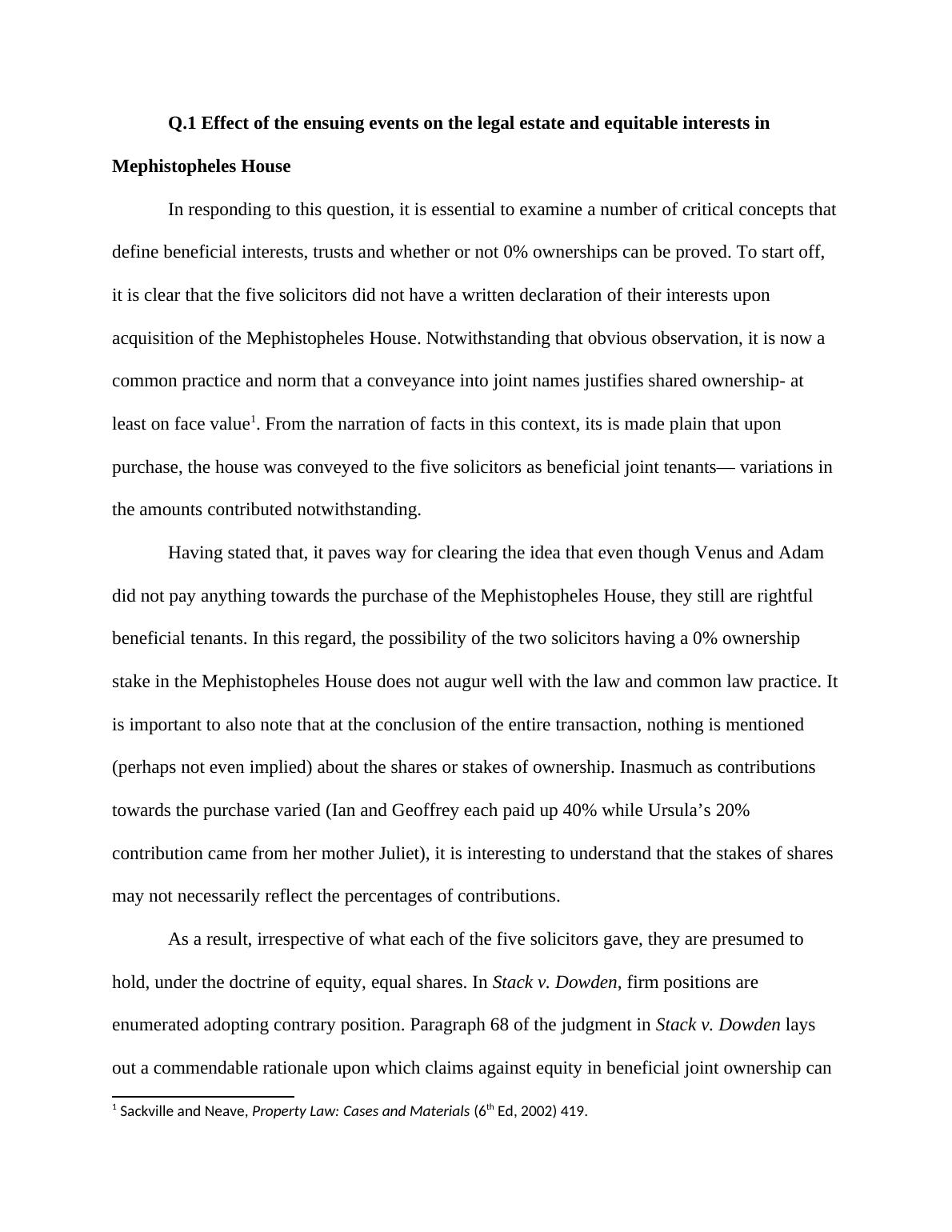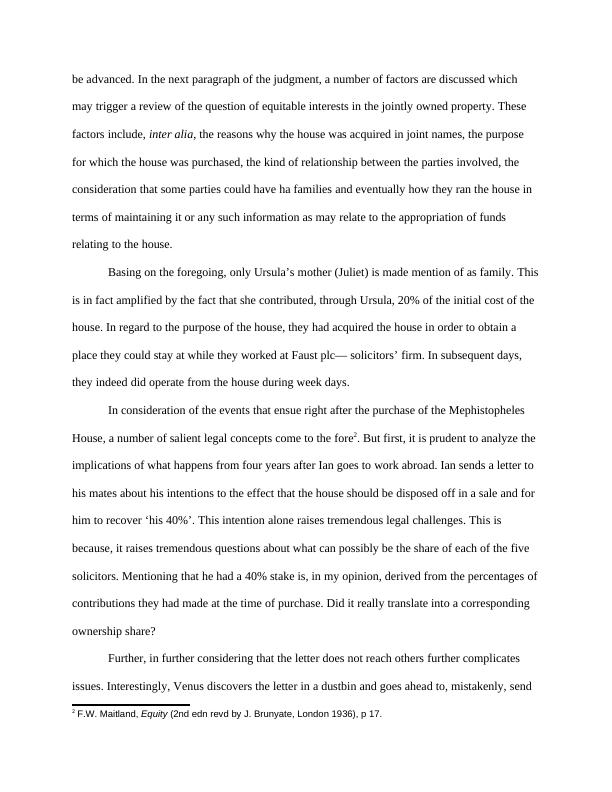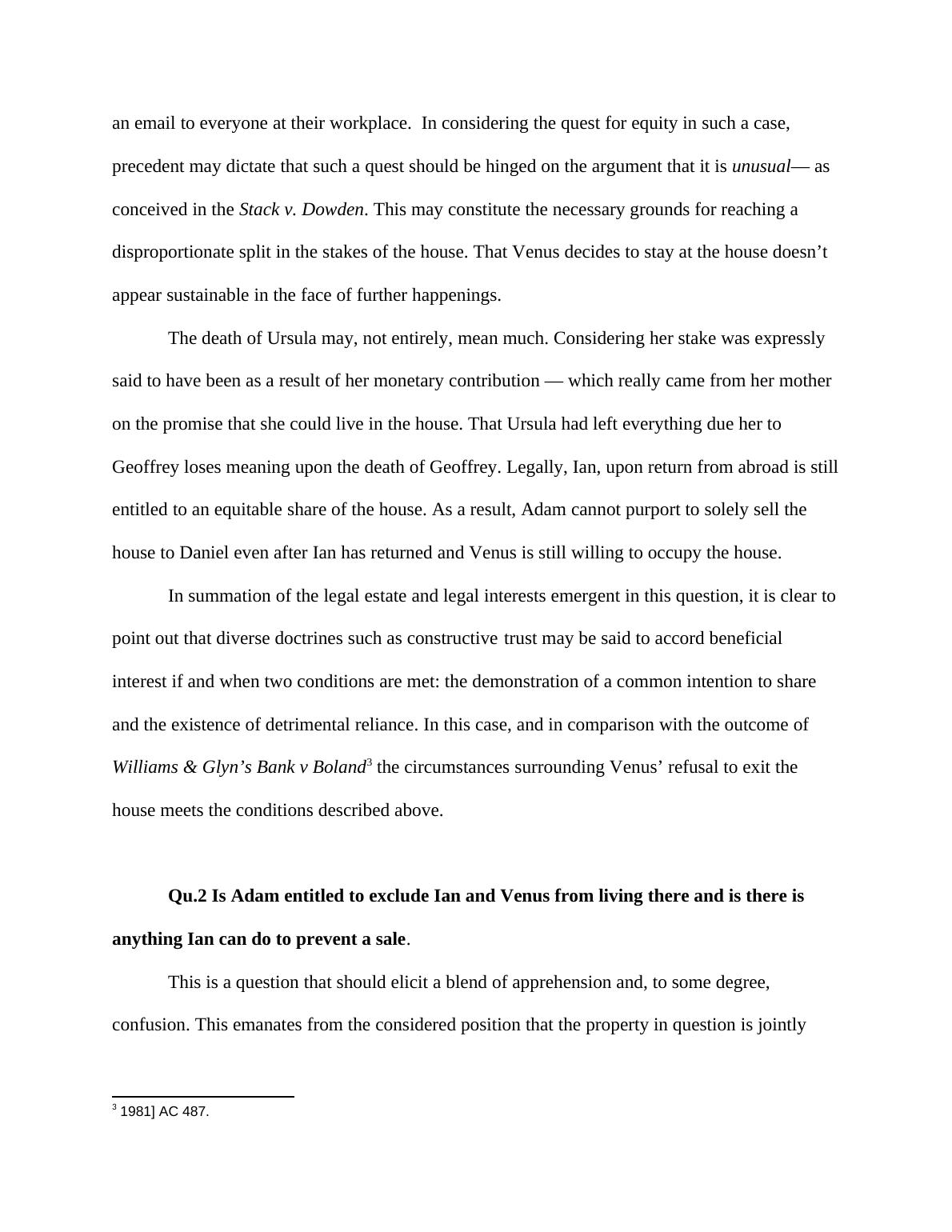Ask a question from expert
Legal Estates & Beneficial Interests
8 Pages2385 Words127 Views
Added on 2020-01-23
Legal Estates & Beneficial Interests
Added on 2020-01-23
BookmarkShareRelated Documents
Q.1 Effect of the ensuing events on the legal estate and equitable interests in Mephistopheles House In responding to this question, it is essential to examine a number of critical concepts thatdefine beneficial interests, trusts and whether or not 0% ownerships can be proved. To start off, it is clear that the five solicitors did not have a written declaration of their interests upon acquisition of the Mephistopheles House. Notwithstanding that obvious observation, it is now a common practice and norm that a conveyance into joint names justifies shared ownership- at least on face value1. From the narration of facts in this context, its is made plain that upon purchase, the house was conveyed to the five solicitors as beneficial joint tenants— variations in the amounts contributed notwithstanding. Having stated that, it paves way for clearing the idea that even though Venus and Adam did not pay anything towards the purchase of the Mephistopheles House, they still are rightful beneficial tenants. In this regard, the possibility of the two solicitors having a 0% ownership stake in the Mephistopheles House does not augur well with the law and common law practice. Itis important to also note that at the conclusion of the entire transaction, nothing is mentioned (perhaps not even implied) about the shares or stakes of ownership. Inasmuch as contributions towards the purchase varied (Ian and Geoffrey each paid up 40% while Ursula’s 20% contribution came from her mother Juliet), it is interesting to understand that the stakes of shares may not necessarily reflect the percentages of contributions. As a result, irrespective of what each of the five solicitors gave, they are presumed to hold, under the doctrine of equity, equal shares. In Stack v. Dowden, firm positions are enumerated adopting contrary position. Paragraph 68 of the judgment in Stack v. Dowden lays out a commendable rationale upon which claims against equity in beneficial joint ownership can 1 Sackville and Neave, Property Law: Cases and Materials (6th Ed, 2002) 419.

be advanced. In the next paragraph of the judgment, a number of factors are discussed which may trigger a review of the question of equitable interests in the jointly owned property. These factors include, inter alia, the reasons why the house was acquired in joint names, the purpose for which the house was purchased, the kind of relationship between the parties involved, the consideration that some parties could have ha families and eventually how they ran the house in terms of maintaining it or any such information as may relate to the appropriation of funds relating to the house. Basing on the foregoing, only Ursula’s mother (Juliet) is made mention of as family. Thisis in fact amplified by the fact that she contributed, through Ursula, 20% of the initial cost of the house. In regard to the purpose of the house, they had acquired the house in order to obtain a place they could stay at while they worked at Faust plc— solicitors’ firm. In subsequent days, they indeed did operate from the house during week days. In consideration of the events that ensue right after the purchase of the Mephistopheles House, a number of salient legal concepts come to the fore2. But first, it is prudent to analyze the implications of what happens from four years after Ian goes to work abroad. Ian sends a letter to his mates about his intentions to the effect that the house should be disposed off in a sale and for him to recover ‘his 40%’. This intention alone raises tremendous legal challenges. This is because, it raises tremendous questions about what can possibly be the share of each of the five solicitors. Mentioning that he had a 40% stake is, in my opinion, derived from the percentages ofcontributions they had made at the time of purchase. Did it really translate into a corresponding ownership share? Further, in further considering that the letter does not reach others further complicates issues. Interestingly, Venus discovers the letter in a dustbin and goes ahead to, mistakenly, send 2F.W. Maitland, Equity (2nd edn revd by J. Brunyate, London 1936), p 17.

an email to everyone at their workplace. In considering the quest for equity in such a case, precedent may dictate that such a quest should be hinged on the argument that it is unusual— as conceived in the Stack v. Dowden. This may constitute the necessary grounds for reaching a disproportionate split in the stakes of the house. That Venus decides to stay at the house doesn’t appear sustainable in the face of further happenings. The death of Ursula may, not entirely, mean much. Considering her stake was expressly said to have been as a result of her monetary contribution — which really came from her mother on the promise that she could live in the house. That Ursula had left everything due her to Geoffrey loses meaning upon the death of Geoffrey. Legally, Ian, upon return from abroad is stillentitled to an equitable share of the house. As a result, Adam cannot purport to solely sell the house to Daniel even after Ian has returned and Venus is still willing to occupy the house. In summation of the legal estate and legal interests emergent in this question, it is clear topoint out that diverse doctrines such as constructive trust may be said to accord beneficial interest if and when two conditions are met: the demonstration of a common intention to share and the existence of detrimental reliance. In this case, and in comparison with the outcome of Williams & Glyn’s Bank v Boland3 the circumstances surrounding Venus’ refusal to exit the house meets the conditions described above. Qu.2 Is Adam entitled to exclude Ian and Venus from living there and is there is anything Ian can do to prevent a sale.This is a question that should elicit a blend of apprehension and, to some degree, confusion. This emanates from the considered position that the property in question is jointly 31981] AC 487.

End of preview
Want to access all the pages? Upload your documents or become a member.
Related Documents
Impact on the Legal Estate and Equitable Interestslg...
|8
|3076
|279
Legal Aspects of Property Law Assignmentlg...
|10
|2582
|174